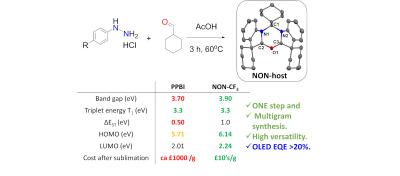Researchers from the University of Manchester and the University of Cambridge, led by Prof. Alexander Romanov, have discovered a new class of OLED host material, that is highly efficient and also is very easy to synthesize, and thus could be very cheap to produce.
Compared with PPBI, one of the popular hosts for blue OLEDs, the new 1,3,5-oxadiazines (NON) materials possess the same or improved characteristics, such as wide band gap and high triplet state energy up to 3.3 eV, whilst costing 100 times less after sublimation. Dr Hwan-Hee Cho from Optoelectronics Group at the University of Cambridge performed the first tests in deep-blue OLED architecture to demonstrate that NON-hosts can result in up to 21% EQE at practical brightness with CIE colour coordinates (0.17, 0.16) – outperforming other commonly used hosts in the same device stack. NON-host materials and their further derivatives have a strong potential for the OLED community to unlock high-performance electronic displays.


